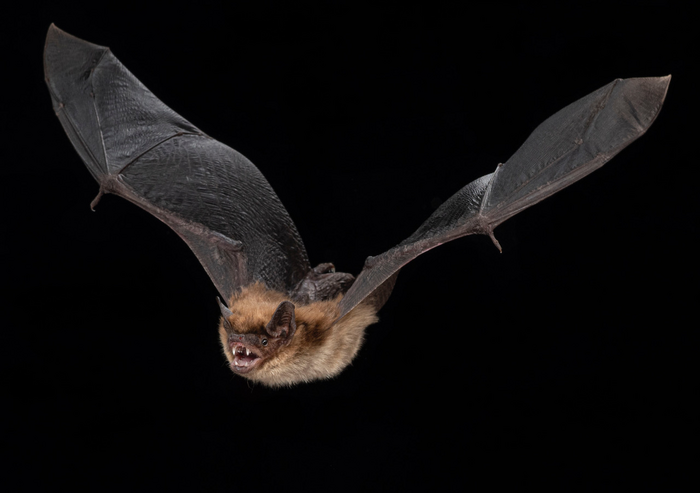The most common bat in the United States, the big brown bat, boasts an unusually long lifespan of up to 19 years. A new study led by University of Maryland researchers identifies one of the secrets to this bat’s exceptional longevity: hibernation.

Credit: Brock and Sherri Fenton
The most common bat in the United States, the big brown bat, boasts an unusually long lifespan of up to 19 years. A new study led by University of Maryland researchers identifies one of the secrets to this bat’s exceptional longevity: hibernation.
“Hibernation has allowed bats, and presumably other animals, to stay in northerly or very southerly regions where there’s no food in the winter,” said the study’s senior author, UMD Biology Professor Gerald Wilkinson. “Hibernators tend to live much longer than migrators. We knew that, but we didn’t know if we would detect changes in epigenetic age due to hibernation.”
The researchers determined that hibernating over one winter extends a big brown bat’s epigenetic clock—a biological marker of aging—by three-quarters of a year. The study, published in the journal Proceedings of the Royal Society Bon August 10, 2022, also included scientists from McMaster University and the University of Waterloo, both in Ontario, Canada.
They analyzed small tissue samples taken from the wings of 20 big brown bats (Eptesicus fuscus) during two periods: in the winter when they hibernated and in the summer when they were active. The bats, kept in a research colony at McMaster University, ranged in age from less than 1 year old to a little over 10 years old.
Once the samples were collected, the researchers measured changes in DNA methylation—a biological process associated with gene regulation—between samples taken from the same animal during active and hibernating periods. They discovered that changes in DNA methylation occurred at certain sites in the bat’s genome, and these sites appeared to be affecting metabolism during hibernation.
“It’s pretty clear that the sites that decrease methylation in the winter are the ones that appear to be having an active effect,” Wilkinson said. “Many of the genes that are nearest to them are known to be involved in regulating metabolism, so they presumably keep metabolism down.”
Some of these genes are the same ones that Wilkinson and fellow researchers identified as “longevity genes” in a previous study. Wilkinson said that there is significant overlap between the hibernation genes and the longevity genes, further highlighting the link between hibernation and longer lifespans.
The earlier study also established the first epigenetic clock for bats, capable of accurately predicting the age of any bat in the wild. That clock was applied to this latest study, enabling the researchers to demonstrate that hibernation reduces a bat’s epigenetic age in comparison to a non-hibernating animal of the same age.
Studies like this help explain why bats have longer lifespans than expected for a small mammal about the size of a mouse. However, they also raise new questions.
“We still don’t have a very good understanding of why some bats can live a really long time and other ones don’t,” Wilkinson said. “We’ve shown that the ones that live a really long time all share the ability to hibernate, or to go into torpor frequently. That seems to be a corollary, but it’s not sufficient because hibernating rodents don’t live 20 years.”
Wilkinson said he is planning a follow-up study to compare epigenetic aging in big brown bats in Canada, where they hibernate, with the same species in Florida, where they do not hibernate. In doing so, Wilkinson hopes to get an even clearer picture of the role that hibernation plays in prolonging lifespans.
###
In addition to Wilkinson, UMD co-authors on the study include Isabel Sullivan (M.S. ’21, marine estuarine environmental sciences) and Danielle Adams (Ph.D. ’19, biological sciences).
This research was supported by the American Society of Mammalogists; Sigma Xi; the University of Maryland Graduate Student Government; the College of Computer, Mathematical, and Natural Sciences; the Natural Sciences and Engineering Research Council of Canada (NSERC) (Discovery Grant No. RGPIN-2020-06906) and a NSERC Post-Graduate Scholarship. This story does not necessarily reflect the views of these organizations.
The paper, titled “Big brown bats experience slower epigenetic ageing during hibernation,” was published in Proceedings of the Royal Society B on August 10, 2022.
Journal
Proceedings of the Royal Society B Biological Sciences
DOI
10.1098/rspb.2022.0635
Article Title
Big brown bats experience slower epigenetic ageing during hibernation




